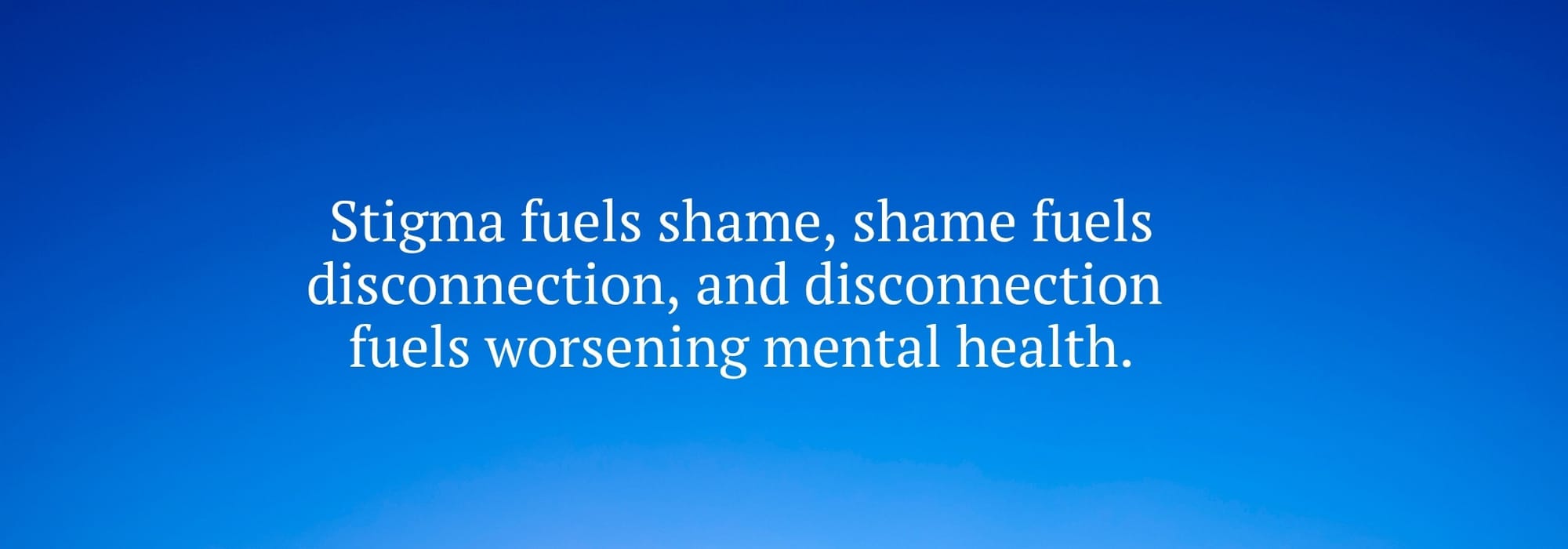We look at the insidious impact of stigma to uncover its real-world effects, and the part in plays it perpetuating mental health issues themselves
‘Am I going to be seen as less capable of doing my job if I disclose my diagnosis at work?’ ‘Will a friend think twice about our friendship if I tell them about my mental health issues?’ If you experience mental health problems, then you’re probably no stranger to asking yourself questions like these, but what’s underpinning them is stigma. You might not even notice it on a conscious level, it’s just lurking there in the shadows, impacting decisions and actions on a day-to-day basis. And while, collectively, we have a general awareness that stigma exists, have you ever stopped to really think about its deep and harrowing impact, or paused to reflect on how much it actually affects yours and others’ lives?
What is stigma?
People experiencing mental health issues often face two layers of challenge: the first being the mental health problem itself, and second is the associated stigma.
In a recent report on attitudes towards mental illness, Mind describes stigma as “made up of problems of knowledge, attitude, and behaviour”. One of the most famous descriptions, by sociologist Erving Goffman, relates stigma to “an attribute that is deeply discrediting”. More recently, researchers, in the Journal of Evaluation in Clinical Practice, described stigma as comprising components such as “labelling, negative stereotyping, linguistic separation, and power asymmetry”.
Essentially, what it boils down to in this context is someone holding negative perceptions, and beliefs, against a person due to their mental health condition, which ultimately leads to discrimination. And, more often than not, stigma is based on misinformation, misconceptions, prejudice, and stereotypes.
Therapist Tina Chummun believes that “misunderstanding and misconceptions” arise because “many people simply lack education and awareness about mental health conditions”. She describes stigma as “reflecting unresolved fears projected onto others”. When we encounter someone struggling, she says, “it activates our own neural patterns around our discomfort, helplessness, or confusion”.

Mental health related-stigma today
Mind’s 2024 report evidences a combination of positive and negative shifts in mental health stigma in England. While efforts have been made to normalise discussions, it says that “mental health-related knowledge and intended behaviour towards people with mental health problems” have, unfortunately, regressed to the levels they were at in 2009. Additionally, attitudes towards mental illness have partially regressed to 2014 levels. This is likely linked to reduced trust in community mental health support, rather than an increase in “exclusionary or prejudicial attitudes”.
There is some positive news though. Attitudes in the workplace have “improved significantly” since 2015, in “both perceived and actual stigma”. Additionally, the gap between conditions which tend to be less stigmatised – such as depression – and those which are often more stigmatised – like schizophrenia – is narrowing.
Stigma in real life
The words ‘discredited’ and ‘tainted’, in Goffman’s definition, resonate with me. About 10 years ago, I was diagnosed with borderline personality disorder (BPD) and it remains one of the most misunderstood – and highly contested – diagnoses.
“Stigma isn’t evenly distributed,” says Tina. “Conditions like anxiety and depression are now more socially accepted, because they align with our narratives of vulnerability and stress in a modern world. But diagnoses like BPD, schizophrenia, or dissociative disorders, carry heavier social judgements.”
I’ve been labelled as a timewaster or an attention seeker when asking for support – people say: “You’re fine, don’t be so dramatic.” In the face of this dismissal, it was challenging for me to find the resilience to ask for help again in the future. As Tina points out, stigma can leave individuals “disconnected from the very support systems they need”. The most common reaction I receive when speaking openly about my mental health problems though is surprise. People say: “But you’re so calm, I would never have guessed!” It makes me feel uneasy, as if people are still buying into the stereotypes of how mental health problems present, or who can experience them.
As a teacher, I’ve worried that speaking openly could make others view me as less capable. Although attitudes in workplaces are improving according to Mind, a YouGov poll shows that almost a quarter of UK adults said that they would ‘reconsider’ using the professional services of a “doctor, nurse, teacher, police officer, etc.” if they knew they had a diagnosis of mental illness. Stigma leaves individuals feeling unsafe to bring their ‘full selves’ to work, as well as less able to request reasonable adjustments.
Stigma feeds shame
As Tina describes, mental health stigma can cause isolation, or people to limit their social interactions. “People living with more stigmatised conditions often feel profoundly invalidated, not heard or seen.”
For me, stigma is at its messiest and most complex in social situations. In newer friendships, where trust is still growing, I get stuck between my need to feel authentic, and deep-rooted embarrassment. While I know, rationally, that mental health problems don’t make me shameful – and neither does talking about them – when I sense someone’s discomfort, I feel exposed and raw. According to the YouGov poll shared by Rethink, 35% of UK adults said “they would reconsider becoming someone’s friend if they had a diagnosis of severe mental illness”. In the early stages of friendship, I feel particularly vulnerable, and it can be hard to know when, or how much, to open up. This, in itself, can be a barrier to real support and connection.
Tina Chummun notes the impact of this ‘vicious loop’: “Stigma fuels shame, shame fuels disconnection, and disconnection fuels worsening mental health.” When I speak about my mental health problems and am met non-judgementally, however, my shame dissolves. The acceptance opens up space for connection and belonging. I feel relief that I no longer need to hide part of myself – I’m free to bring my ‘whole self’ to the relationship.

Appreciating honesty
All of us have a part to play when it comes to reducing stigma. Here are a few signposts paving the way to a more respectful mental health landscape:
-
Speak about differences in a non-judgemental way. How do you speak about someone whose lived experience is different to yours? How do you react to something you don’t immediately understand? It’s important to try to remain curious and gentle, rather than withdrawing or being judgemental. It’s OK not to know everything, but you can still approach dialogue with respect, empathy, and an open mind.
-
Consider your language. Be aware of phrases and words that can be demeaning or stigmatising, and consciously try to be sensitive to this. You might want to look up advice on various charity sites, pay attention to the vocabulary used when a person is speaking about their own health, or ask directly to respect their preferences.
-
Be reflective and self-aware. In a conversation, there should be balance – if someone is exerting power over you, it can be demeaning and dismissive. In an open conversation, without stigma, you both should be able to ask for clarification when needed, and stay present even if things feel complex.
Stigma can be invasive and isolating, but displaying more accepting and understanding behaviours yourself, and seeking these in others, can help to break down those barriers. It’s truly life-changing to find someone you can trust with vulnerable parts of yourself – and you fully deserve that, no strings or stigma attached.


Comments